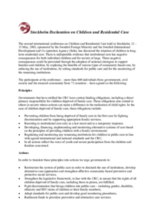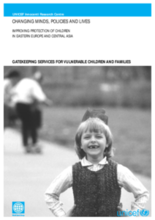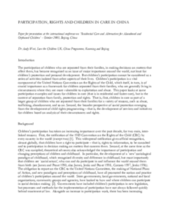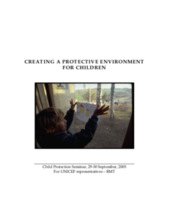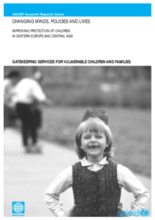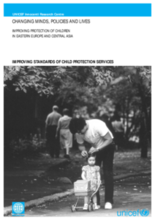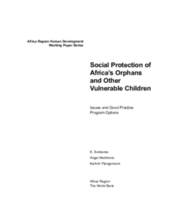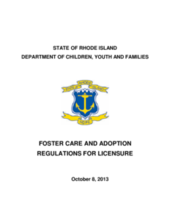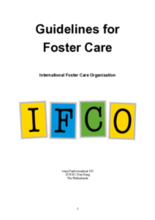Displaying 181 - 190 of 191
This document represents the agreements made at the Second International Conference on Children and Residential Care in Stockholm, Sweden, held from 12 to 15 May, 2003. The conference was sponsored by the Swedish Foreign Ministry and the Swedish International Development and Co-operation Agency (Sida). The document includes the principles and actions, regarding children and residential care, that were agreed upon by the participants at the conference.
A 2 part document containing a concept paper on strategies that divert children from institutional care into community based support programs, and a toolkit with practical resources for implementing improved gate keeping.
This paper defines concepts and highlights key topics around orphaned and vulnerable children. It stresses the importance of creating a child-friendly environment and utilizing a holistic approach to care, both which identify children as central participants in decision-making about care and placement.
This report is the result of a seminar held in Kazakhstan 2004. It focuses on social welfare sector reform, and includes topics such as expanding legislative agendas and financing frameworks, as well as gate keeping. Case studies of reform processes from Romania, Tajikistan and Serbia are discussed. Includes conference agenda.
Practical guidance, case examples, and tools to assess, monitor, and evaluate child protection services and facilitate reform away from institutionalization of children.
Contains practical tools and policy guidance for family and child welfare policy makers and practitioners. Relevant topics include gatekeeping, redirecting resources into preventive and family based services, and standards of care.
Overviews the causes and consequences of the orphan crisis in Africa and analyzes current social protection responses. Suggests good practices in social protection of orphans and vulnerable children.
These regulations were developed in the United States (in the state of Rhode Island) to assess all individuals who care for children away from their legal parents. It may contain useful information for organizations and countries that are developing their own regulations for foster carers.
Guidelines for foster care, developed by IFCO at a special Working Group Meeting held in Bangkok, Thailand from 1-4 May 1995 in cooperation with the Department of Public Welfare, Bangkok.

